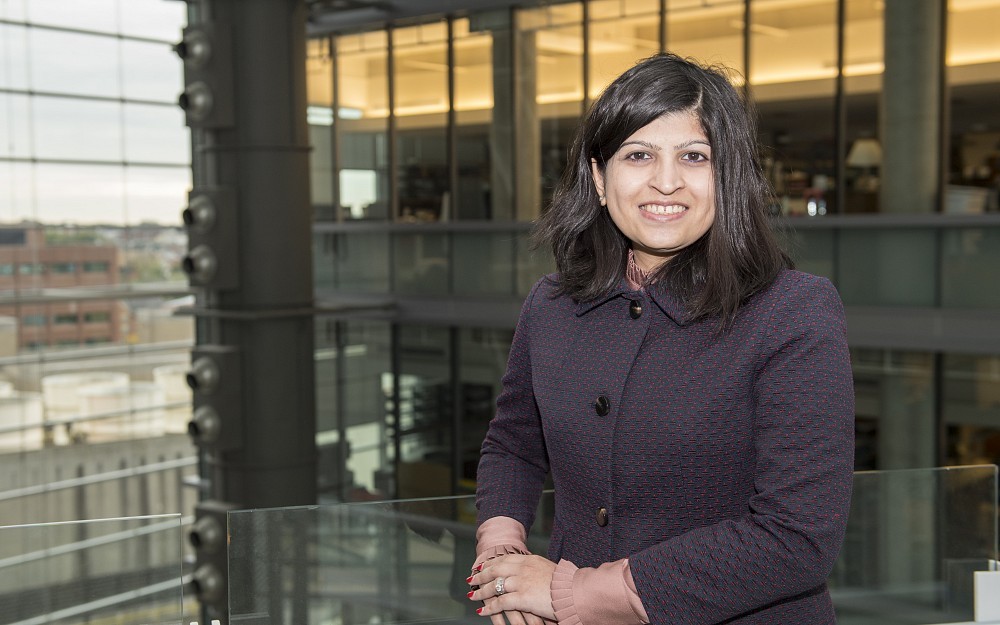
UC Faculty Leads Initiative to Increase Social Media Use in Nephrology
Increasing the effective and responsible use of social media by people in medicine, specifically nephrology, is the goal of the Nephrology Social Media Collective Internship. Silvi Shah, MD, assistant professor in the Division of Nephrology, Kidney CARE Program at the University of Cincinnati College of Medicine, gave an oral presentation titled "Mentorship in the Digital AgeNephrology Social Media Collective Internship 3-Year Experience in the Blazing the Trail in Education session at the American Society of Nephrology meetings in New Orleans, on Friday, Nov. 3.
"In spite of an increase in social media activity by health care professionals, there is a lack of formal education amongst them, says Shah. "It is therefore important to know how to use social media effectively and responsibly.
The Nephrology Social Media Collective (NSMC) Internship has three focus areasknowledge, competence and professionalism, according to Shah. The NSMC internship began in 2015 with seven faculty from around the world, including educators, clinicians and researchers in nephrology. The number of faculty has grown to 24 and the number of interns has grown as well, from four in 2015 to 11 this year.
Applications for NSMC internships are accepted every year in December and January. Selection is based on the applicants CV and personal statement.
"We ask each applicant to tailor their personal statement towards their interest in social media and how this internship would help them foster their career in medicine, says Shah. "When the candidates are selected, we have an entrance discussion with them regarding their goals.
After being accepted, interns are required to have a Twitter account and are expected to contribute three to four hours of each month for NSMC internship-related activities to help them achieve their goals. Each intern is paired with two mentors and the main medium of communication is through Twitter direct message channel and quarterly conference calls. The curriculum, which is updated yearly by the entire faculty, requires participation in four projects--NephJC (an online nephrology journal club), Renal Fellow Network Blog, Book Club and NephMadness, which is in collaboration with the American Journal of Kidney Disease.
"The key metric by which we assess the success of our internship is through the leadership positions our interns get in various international and national organizations, says Shah. "Of the 22 interns that have graduated so far, 12 of them hold leadership positions in leading organizations including American Society of Nephrology, International Society of Nephrology, Women in Nephrology and Clinical Journal of American Society of Nephrology.
Shah, who will be assuming the role of associate program director of NSMC internship in 2018, says the mission of the internship is to cultivate diverse leaders in the use of social media in medicine through worldwide collaboration. She says that the NSMC internship gave her the opportunity to meet many dynamic educators who guided her in this path. That includes Joel Topf, MD, of St. Clair Nephrology in , Detroit, who is the NSMC program director, Matthew Sparks, MD of Duke University and Swapnil Hiremath, MD, of the University of Ottawa, who are key NSMC collaborators.
The NSMC interns and faculty are from all around the world including Asia, Australia and Europe, representing a diverse mix of medical backgrounds, including a nurse and a PhD nutrition student.
"The most important thing is this demonstrates a collaboration between so many individuals from so many different places and from many different professional areas, says Shah. "We have people from academia as well as from community medicine. Our future plans include growing individual mentorship, diversifying the curriculum and incorporating different time zones.
Related Stories
Ohio could soon make breast cancer screenings more affordable
May 9, 2025
The University of Cincinnati Cancer Center's Ann Brown was featured in Local 12 and Cincinnati Enquirer reports on a bill introduced by Rep. Jean Schmidt in the Ohio legislature that seeks to eliminate out of pocket medical expenses such as copays and deductibles associated with supplemental breast cancer screenings.
Preparing students for artificial intelligence in education
May 8, 2025
Laurah Turner, PhD, associate dean for artificial intelligence and educational informatics at the University of Cincinnati's College of Medicine, recently joined the For The Love of EdTech podcast to discuss the usage of personalized learning and AI coaches to enhance educational experiences.
UC lab-on-a-chip devices take public health into home
May 8, 2025
University of Cincinnati engineers created a new device to help doctors diagnose depression and anxiety. The “lab-on-a-chip” device measures the stress hormone cortisol from a patient’s saliva. Knowing if a patient has elevated stress hormones can provide useful diagnostic information even if patients do not report feelings of anxiety, stress or depression in a standard mental health questionnaire.
